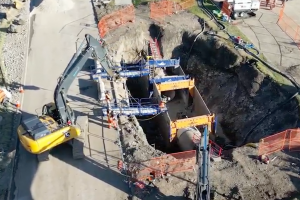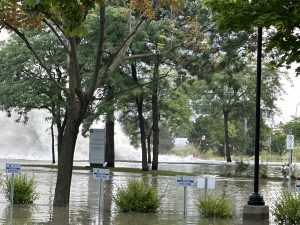Summer’s half over. The recent holiday Monday was a time to fire up the grill and throw on some burgers and have the neighbours over. Keep the beer cold in a tub of ice. Then sit around, sipping beer and swapping lies until well after dark on a warm summer evening.
Unless, of course, you live in Fort McMurray.
The northern Alberta city was evacuated because of a fast-moving forest fire in May. People didn’t get back into their homes until June. And just recently they were deluged by intense rain.
No backyard barbecues for people with flooded basements. Instead, they were using canoes to paddle to the local convenience store for a few groceries. One guy even started up his Sea-Doo to scoot around his neighbourhood.
It’s been a bad year so far for lots of communities, although Fort McMurray’s case is especially grim. But there has been flooding in many places: Estevan, Sask., got hit hard. So did High Prairie, Alta. and northeastern British Columbia.
Flash flooding also killed two people and caused massive destruction in Maryland. There, the town of Ellicott City received more than six inches of rain in just two hours.
The weather service said it was a 1,000-year event. That means, statistically, you should expect such a downpour only once every 1,000 years.
But because of climate change extreme events whether in Maryland or Alberta are happening more frequently and scientists expect the trend to continue.
Our past experiences with floods are no longer a reliable indicator of either present or future risk.
Stormwater management has become a hot topic of conversation, especially in areas that have recently begun to charge a stormwater levy.
That happened in Mississauga, a Toronto suburb, as well as a scattering of other communities around the country.
When I spoke with Helen Noehammer, who is director of transportation and infrastructure planning in Mississauga, she told me that it’s a growing trend.
The money raised by such levies can be used for maintenance and expansion of a community’s stormwater infrastructure. It’s used for such things as pervious pavements, rain gardens, swales and other things calculated to manage rainfall where it falls, keeping it out of stormsewer networks.
Such works have come to be called green infrastructure and we need a lot more of it.
On a recent visit to Toronto, Mark Carney, the governor of the Bank of England, said that the world will need to spend as much as $7 trillion on green infrastructure over the next 15 to 20 years to cope with aberrant weather caused by climate change.
Carney was quoted by Reuters saying that "the question is how much of that is going to be financed through capital markets."
China has appeared eager to be seen as taking a leadership role in global action to combat climate change. Carney said the Bank of England has been working with the People’s Bank of China for the last 18 months to develop a "green" bond market that could finance environmentally friendly projects as part of a broader set of initiatives.
He said China will raise about $500 billion annually through capital markets to finance "green" projects.
He speculated that such bonds could be attractive to global investors, many of whom are struggling to achieve adequate returns on investment with bond yields at record lows and the global equity markets increasingly volatile.
Naysayers are prone to attribute our wilder weather to natural variability, but science has lately become more able to draw direct links between wild weather and climate change.
American cities are, for the most part, ahead of their Canadian counterparts when it comes to stormwater management. Philadelphia, New Orleans, Detroit and Washington, D.C. have taken the lead in recent years.
Communities everywhere have to follow suit.
Korky Koroluk is an Ottawa-based freelance writer. Send comments to editor@journalofcommerce.com.











Recent Comments
comments for this post are closed